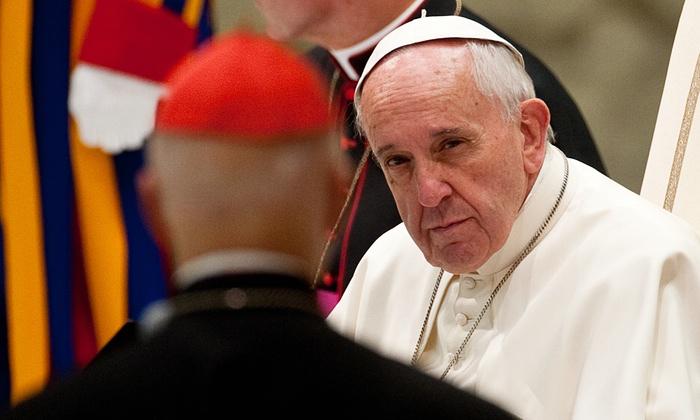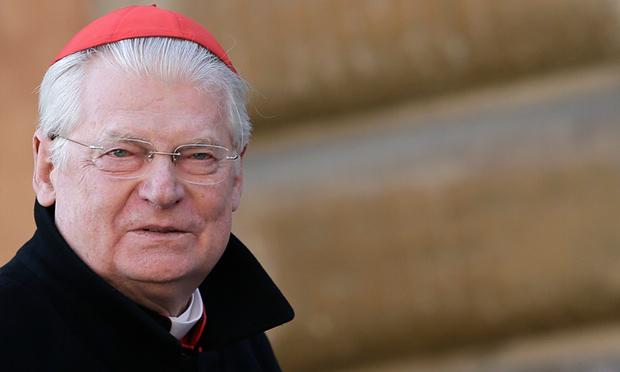|
Pope's rebuff to conservative cardinal stirs Vatican intrigue
By Stephanie Kirchgaessner
[with video] Pope Francis has always said Christians should seek out “encounters”, meetings that expand one’s understanding of the other and increase the capacity for love. But there is one encounter the pope has steadfastly avoided since his election in 2013. Angelo Scola of Milan, the powerful and conservative Italian cardinal many thought would be pope before the surprise choice of the Argentinian Jesuit known as Father Bergoglio, received word of the latest apparent snub last week. A bulletin released by the Vatican press office announced that the archbishop of Milan had regrettably been informed by Francis’s number two, the secretary of state Pietro Parolin, that Francis’s planned trip to Milan in May was off because the pope had too many commitments in Rome. Last year, Francis fell ill shortly before two planned meetings with Scola. The highly anticipated visit to the fashion and finance capital of Italy, which happens to be the most important archdiocese in Italy, if not Europe, would happen in 2017 instead, the Vatican said. It fell to an Italian newspaper – Il Fatto Quotidiano – to point out the awkward fact that Scola is reaching retirement age, after which he will serve at the pleasure of the pope. In other words, he might not be around, professionally speaking, by 2017. And while the pope might be too busy to visit Milan next year, he is nevertheless forging ahead with a planned trip to Mexico in February and is also expected to visit Poland. For some Vatican observers, the decision to cancel Milan was nothing but a routine scheduling decision for a pope who is busy reforming the church’s Roman bureaucracy. But Francis’s apparent reticence to grant Scola a meeting could also be seen as a symbol for everything the pope is trying to change about the Catholic church in Italy, including the Vatican’s historic cosy relationship with conservative politicians. “The pope does not like the idea of the church being in bed with politicians or politics. The Italian hierarchy is very … political and tied in to business and politics. Scola represents that kind of church,” said Robert Mickens, a longtime Vatican journalist and editor-in-chief of Global Pulse magazine. For years, Scola was considered a close ally of Francis’s predecessor, Pope Benedict XVI, and was seen by some as having reached a tacit agreement with Italy’s former centre-right prime minister, Silvio Berlusconi: the church in Italy would not be a leading voice on social justice issues and, in exchange, Berlusconi would respect the church’s views against abortion and other policies. Scola is part of what is known as the “communio” school of theology, which is named after theological journals and was essentially a conservative response to the second Vatican council, which installed a series of modernising reforms in the church 50 years ago. This year, the pope made two moves that defined his desire for change in the Italian hierarchy. In November, in what was described as a barnstorming speech, Francis offered a critical assessment of the church in front of a conference of Italian bishops in Florence, in which he urged them to stop clinging to conservatism and fundamentalism as a response to the problems the church is facing. “Christian doctrine is not a closed system incapable of generating questions, doubts, interrogatives – but is alive, knows being unsettled, enlivened,” he said. More importantly, in October, he appointed two centre-left clerics known as social activists in the Francis mould to two of the most important archdioceses in Italy: Bologna and Palermo. The appointment of Matteo Zuppi, who is known as the “Bergoglio of Italy”, was considered particularly striking, according to an analysis by Vatican watcher John Allen, because of Zuppi’s work for the centre-left Community of Sant’Egidio, which focuses on outreach to the poor and conflict resolution. Zuppi replaced Carlo Caffarra in Bologna, who was long considered aligned with the church’s conservative wing. Mickens notes that Francis could also be avoiding a meeting with Scola – still a possible candidate to replace him someday – so he does not give any appearance of endorsing the Italian. In 2013, the conservative Italian bishops’ conference was so convinced that Scola, one of their own, would be chosen as the next pope that they accidentally released a press release expressing “joy and thanks” for the Milan cardinal’s election 10 minutes after Francis made his first appearance as pope. “The pope is kind of distancing himself from any kind of scenario that looks like he is giving his blessing to a Scola papacy, because now people are starting to think about who might come next,” Mickens said. “He is giving a signal.” Austen Ivereigh, who wrote The Great Reformer, a biography of Francis, said the move could simply be a reflection that the pope – who once said he envisioned a possible five-year-papacy for himself – is now imagining himself in the role of Bishop of Rome for at least two more years. “I am hearing that he is saying he needs seven years to complete his five-year plan. I think that the timetable has been relaxed, so it makes sense to have a big trip – and Milan will be a big trip – later,” Ivereigh said.
|
.
Any original material on these pages is copyright © BishopAccountability.org 2004. Reproduce freely with attribution.

